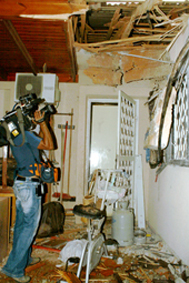Qassam rocket


The Qassam rocket (Arabic: صاروخ القسام Ṣārūkh al-Qassām; also Kassam) is a simple steel rocket filled with explosives, produced by Hamas. Three models have been used. They are all free-flying artillery rockets lacking any guidance system.
The Gaza Strip has been separated from Israel by a security barrier since 1996, which frustrated infiltration into Israel. During its 2005 unilateral disengagement plan, Israel withdrew its civilian and military presence, retaining control over airspace and maritime access. While Qassam rockets were fired regularly even prior to the Israeli Disengagement, the absence of access to targets on the ground has increased the relevance of the rockets, since they were designed to fly over the barrier and strike Israeli targets outside the Strip. Hamas had difficulty establishing rocket-producing and launching infrastructure in the West Bank.[1]
History of the Qassam

Qassam rockets are named after the Izz ad-Din al-Qassam Brigades, the armed branch of Hamas, itself named after an Islamic Mojahed Izz ad-Din al-Qassam who led a Palestinian group during the 1930s. According to Hamas, the Qassam rocket was first developed by Nidal Fat'hi Rabah Farahat and Mohamed Khaled and produced under the direction of Adnan al-Ghoul, the "Father of the Qassam", who was killed by the Israeli army on October 22, 2004.
Qassams were first fired at Israeli civil areas in October 2001. The first Qassam to hit Israeli territory was launched on February 10, 2002. The first time an Israeli city was hit was on March 5, 2002, when two rockets struck Sderot. Some rockets have hit as far as the edge of Ashkelon. The total number of Qassam rockets launched exceeded 1000 by June 9, 2006. During the year 2006 alone, 1000+ rockets were launched. As of May 2008, over 3,000 rockets had been launched[2] and 15 people have been killed by Qassam rockets[3] (see: List of Qassam rocket attacks).
The introduction of the Qassam rocket took Israeli politicians and military experts by surprise.[4] Reactions have been mixed.[5] The Israeli Ministry of Defense views the Qassams as "more a psychological than physical threat."[6] The rockets are fired largely at civilian populations. The Israel Defence Force has reacted to the deployment of the Qassam rockets by deploying the Red Color early warning system in Sderot, Ashkelon and other at-risk targets. The system consists of an advanced radar that detects rockets as they are being launched. Loudspeakers warn civilians to take cover approximately fifteen seconds before impact in an attempt to minimize the threat posed by the rockets. A system called Iron Dome, designed to intercept the rockets before they can hit their targets, is currently under development and is expected to be operational by 2010.
One of the rockets hit the electricity station in Ashkelon and caused electricity shortages in several areas. In another attack, a rocket similar to a Qassam hit an army basic training camp and injured more than 70 Israeli soldiers.
Qassam rocket specifications

Qassam rockets are fueled by mixture of sugar and potassium nitrate, which is a widely available fertilizer. The warhead is filled with TNT and urea nitrate.
| Qassam 1 | Qassam 2 | Qassam 3 | |
|---|---|---|---|
| Length (cm) | 79 | 180 | 200+ |
| Diameter (cm) | 6 | 15 | 17 |
| Weight (kg) | 5.5 | 32 | 90 |
| Explosives Payload (kg) | 0.5 | 5-7 | 10 |
| Maximum Range (km) | 3 | 8-10 | 10 |
Similar rockets
Other Palestinian militant groups also developed home-made rockets, but they are much less common than Hamas' Qassam rocket. The media generally refer to all Palestinian high-trajectory rockets as "Qassam rockets" or "Qassam missiles", while they call most rockets fired from Lebanon "Katyushas", as a Katyusha are not a specific models but a generic class of rockets (most of the rockets fired from Lebanon were manufactured by China[7]).
- Hamas - Qassam rocket (models 1, 2 and 3)
- Palestinian Islamic Jihad - Al Quds 101 & 2
- Popular Resistance Committees - al Nasser-3
- Tanzim - Saria-2
- Fatah - Kafah
References
- ^ Tony Karon (10 February, 2002). "The Homemade Rocket That Could Change the Mideast". Time Magazine.
{{cite news}}: Check date values in:|date=(help) - ^ "The Hamas terror war against Israel". Israel Ministry of Foreign Affairs. Retrieved 2008-06-03.
- ^ "Victims of Palestinian Violence and Terrorism since September 2000". Israel Ministry of Foreign Affairs. Retrieved 2008-03-06. Incidents: June 28, 2004 (2 killed), September 29, 2004 (2 killed), January 15, 2005 (1 killed), June 7, 2005 (3 killed), July 14, 2005 (1 killed), November 15, 2006 (1 killed), November 21, 2006 (1 killed), May 21, 2007 (1 killed), May 27, 2007 (1 killed), February 27, 2008 (1 killed), May 12, 2008 (1 killed)
- ^ IMRA - Saturday, July 15, 2006 Historical Survey of Israeli Leaders: Will Rockets Fall?
- ^ Peres: Enough with Qassam hysteria - Israel News, Ynetnews
- ^ Defense Ministry: Trade with China resumed, Ynetnews, 3 January 2006
- ^ Questions & Answers: 122mm cluster munition rockets (Human Rights Watch, 18-10-2006)
See also
External links
- about the Qassam-sderotmedia
- GlobalSecurity.org - Qassam Rocket
- The Homemade Rocket That Could Change The Mideast – By Tony Karon, TIME Online Edition (10 February, 2002)
- Qassam-2 missile a wild card in Mideast conflict – CNN (March 5, 2002)
- Gaza rockets kill two in Israel, BBC article (June 28, 2004)
- Palestinian Weapons Production and Smuggling : Missiles & Rockets
- A Visit to a Gaza Rocket Factory, by Ulrike Putz, der Spiegel international (January 29, 2008, in English)
- Victims of Qassam rockets in Sderot
- Rocketboom visits Sderot
- Katyusha & Qassam Rockets on www.aerospaceweb.org
- Updates about rocket attacks from Gaza into Israel on twitter.com
